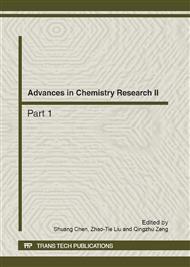p.721
p.726
p.731
p.736
p.741
p.747
p.751
p.755
p.760
Synthesis of CoO and Co3O4 Nanoparticles by Salt-Assisted Combustion Method
Abstract:
In the present study, CoO, which is hard to synthesize because of the chemical activity of cobalt metal, and the popular Co3O4 have been successfully controlled produced by a salt-assisted combustion method (SACM), in which Co(NO3)2•6H2O, polyethylene glycol (PEG2000) were chosen as oxidant and fuel respectively. The CoO and Co3O4 nanoparticles were investigated by high resolution transmission electron microscopy (HRTEM), selected area electron diffraction (SAED), x-ray diffraction (XRD), simultaneous thermogravimetric and differential thermal analysis (TG-DTA) and N2 adsorption. It is found that the pure CoO were obtained whatever adjusting the weight ratio of Co(NO3)2•6H2O and PEG2000 in the absence of inert salt. While, well-dispersed Co3O4 nanoparticles with a high specific surface area were successfully obtained with the introduction of NaCl or KCl in the system, which results from the fact that the introduction of inert inorganic salt as a agglomeration inhibitor into the redox mixture precursor led to the breakup of fractal nanocrystallite agglomerates. A mechanism was proposed to illustrate the possible formation processes and the role of the inert inorganic salt.
Info:
Periodical:
Pages:
741-744
Citation:
Online since:
July 2012
Authors:
Keywords:
Price:
Сopyright:
© 2012 Trans Tech Publications Ltd. All Rights Reserved
Share:
Citation:


